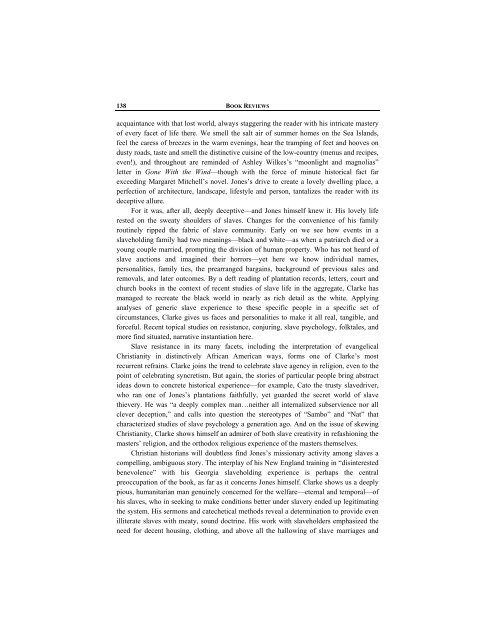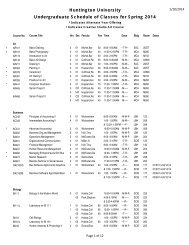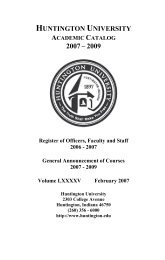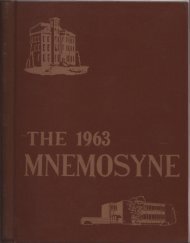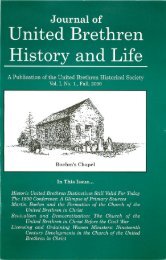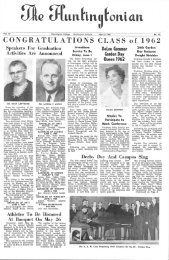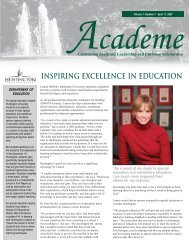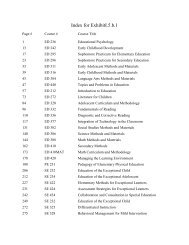Gillian Clark, Christianity and Roman Society - Huntington University
Gillian Clark, Christianity and Roman Society - Huntington University
Gillian Clark, Christianity and Roman Society - Huntington University
Create successful ePaper yourself
Turn your PDF publications into a flip-book with our unique Google optimized e-Paper software.
138 BOOK REVIEWS<br />
acquaintance with that lost world, always staggering the reader with his intricate mastery<br />
of every facet of life there. We smell the salt air of summer homes on the Sea Isl<strong>and</strong>s,<br />
feel the caress of breezes in the warm evenings, hear the tramping of feet <strong>and</strong> hooves on<br />
dusty roads, taste <strong>and</strong> smell the distinctive cuisine of the low-country (menus <strong>and</strong> recipes,<br />
even!), <strong>and</strong> throughout are reminded of Ashley Wilkes’s “moonlight <strong>and</strong> magnolias”<br />
letter in Gone With the Wind—though with the force of minute historical fact far<br />
exceeding Margaret Mitchell’s novel. Jones’s drive to create a lovely dwelling place, a<br />
perfection of architecture, l<strong>and</strong>scape, lifestyle <strong>and</strong> person, tantalizes the reader with its<br />
deceptive allure.<br />
For it was, after all, deeply deceptive—<strong>and</strong> Jones himself knew it. His lovely life<br />
rested on the sweaty shoulders of slaves. Changes for the convenience of his family<br />
routinely ripped the fabric of slave community. Early on we see how events in a<br />
slaveholding family had two meanings—black <strong>and</strong> white—as when a patriarch died or a<br />
young couple married, prompting the division of human property. Who has not heard of<br />
slave auctions <strong>and</strong> imagined their horrors—yet here we know individual names,<br />
personalities, family ties, the prearranged bargains, background of previous sales <strong>and</strong><br />
removals, <strong>and</strong> later outcomes. By a deft reading of plantation records, letters, court <strong>and</strong><br />
church books in the context of recent studies of slave life in the aggregate, <strong>Clark</strong>e has<br />
managed to recreate the black world in nearly as rich detail as the white. Applying<br />
analyses of generic slave experience to these specific people in a specific set of<br />
circumstances, <strong>Clark</strong>e gives us faces <strong>and</strong> personalities to make it all real, tangible, <strong>and</strong><br />
forceful. Recent topical studies on resistance, conjuring, slave psychology, folktales, <strong>and</strong><br />
more find situated, narrative instantiation here.<br />
Slave resistance in its many facets, including the interpretation of evangelical<br />
<strong>Christianity</strong> in distinctively African American ways, forms one of <strong>Clark</strong>e’s most<br />
recurrent refrains. <strong>Clark</strong>e joins the trend to celebrate slave agency in religion, even to the<br />
point of celebrating syncretism. But again, the stories of particular people bring abstract<br />
ideas down to concrete historical experience—for example, Cato the trusty slavedriver,<br />
who ran one of Jones’s plantations faithfully, yet guarded the secret world of slave<br />
thievery. He was “a deeply complex man…neither all internalized subservience nor all<br />
clever deception,” <strong>and</strong> calls into question the stereotypes of “Sambo” <strong>and</strong> “Nat” that<br />
characterized studies of slave psychology a generation ago. And on the issue of skewing<br />
<strong>Christianity</strong>, <strong>Clark</strong>e shows himself an admirer of both slave creativity in refashioning the<br />
masters’ religion, <strong>and</strong> the orthodox religious experience of the masters themselves.<br />
Christian historians will doubtless find Jones’s missionary activity among slaves a<br />
compelling, ambiguous story. The interplay of his New Engl<strong>and</strong> training in “disinterested<br />
benevolence” with his Georgia slaveholding experience is perhaps the central<br />
preoccupation of the book, as far as it concerns Jones himself. <strong>Clark</strong>e shows us a deeply<br />
pious, humanitarian man genuinely concerned for the welfare—eternal <strong>and</strong> temporal—of<br />
his slaves, who in seeking to make conditions better under slavery ended up legitimating<br />
the system. His sermons <strong>and</strong> catechetical methods reveal a determination to provide even<br />
illiterate slaves with meaty, sound doctrine. His work with slaveholders emphasized the<br />
need for decent housing, clothing, <strong>and</strong> above all the hallowing of slave marriages <strong>and</strong>


